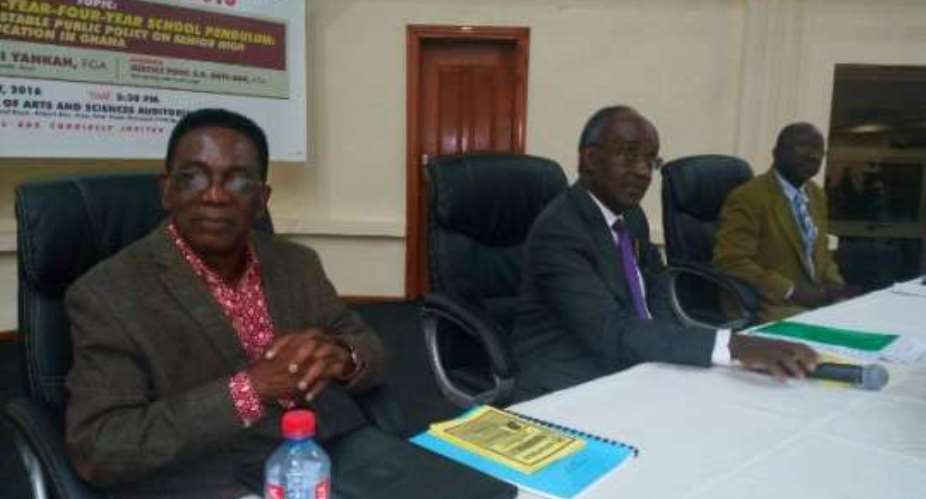By D.I. Laary, GNA
Accra, May 6, GNA - Professor Kwesi Yankah, the Vice-President of Central University, has urged politicians to stop varying senior high school (SHS) education policy hastily and focus on addressing systemic social disparities challenging the country's education sector.
The erratic change of policy, driven largely by partisan political motives, he said, undermined progressive and quality academic performance among students with candidates from less endowed schools being the most affected.
Professor Yankah, who gave the recommendation during the occasional lecture of Ghana Academy of Arts and Sciences said repeated modification of the policy without regard to significant national needs negatively affected quality workforce and productivity.
The lecture, on the topic: 'The Three-Four-Year School Pendulum; Towards a Stable Public Policy on Senior High School Education in Ghana,' attracted policymakers, politicians, academia, students and a host of education actors.
'Swings in the senior high school education policy must stop and give way to flexible policy where options are exercised and yields to the individual and education needs,' Professor Yankah said.
'As a nation we are hurting every passing day and governments sometimes with mere party manifestoes capriciously fiddle with our policy, and the children in less endowed or privileged schools are the most victims and our human resource base suffer,' he said.
He said although course duration was one of the greatest factors that determined plight of SHS candidates' performance at the West African Senior Secondary School Examination level, there were other multiple factors that undermined performance of candidates.
Prof. Yankah said elements such as infrastructure, learning facilities, teacher motivation and quality of basic schools were issues that ought to be considered to bridge academic performance gap between deprived and better endowed schools.
'There is a clear lack of equity in education quality leading to high differential outcomes in learning and academic abilities,' he said.
Prof. Yankah said: 'Policy agenda that ensures an inbuilt flexibility towards public examinations in high schools should be part of our arsenal in fighting to reduce systemic inequalities in ensuring greater social justices.'
He said the three-year SHS education policy better flourished among schools endowed with better education resources while the four-year was more inclusive and acknowledged all the inequities in the system which could not be remedied by one straight forward policy.
Prof. Yankah recommended a flexible system where students from better endowed schools or educational institutions could exercise the option to do a full four-year or three-year programme.
'The flexible start will enable significant differentials among students in the first year to be addressed over the period before they progress to the second year where more focused teaching is done,' he added.
GNA





 We’ll no longer tolerate your empty, unwarranted attacks – TUC blasts Prof Adei
We’ll no longer tolerate your empty, unwarranted attacks – TUC blasts Prof Adei
 Bawumia donates GHc200,000 to support Madina fire victims
Bawumia donates GHc200,000 to support Madina fire victims
 IMF to disburse US$360million third tranche to Ghana without creditors MoU
IMF to disburse US$360million third tranche to Ghana without creditors MoU
 Truck owner share insights into train collision incident
Truck owner share insights into train collision incident
 Paramount chief of Bassare Traditional Area passes on
Paramount chief of Bassare Traditional Area passes on
 Two teachers in court over alleged illegal possession of BECE papers
Two teachers in court over alleged illegal possession of BECE papers
 Sunyani: Victim allegedly shot by traditional warriors appeals for justice
Sunyani: Victim allegedly shot by traditional warriors appeals for justice
 Mahama vows to scrap teacher licensure exams, review Free SHS policy
Mahama vows to scrap teacher licensure exams, review Free SHS policy
 Government will replace burnt Madina shops with a new three-story, 120-store fac...
Government will replace burnt Madina shops with a new three-story, 120-store fac...
